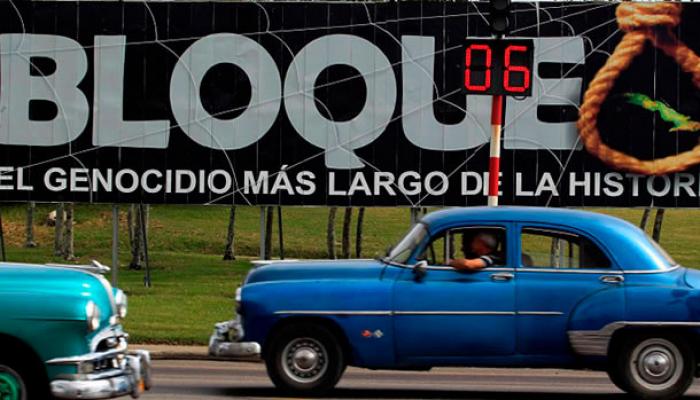On February 9, 1995, a year before the Helms-Burton Act of 1996, House Representative, and New York Democrat Charles Rangel introduced a bill, the Free Trade with Cuba Act, designed to remove the blockade and begin a dialogue with Cuba. Congress opted instead for a hard-line stance against Cuba.
Can you pick up the story at this point?
In 1996 The Cuban Liberty and Democratic Solidarity Act came along. The legislation is better known as The Helms-Burton Act The Act and it is named for Senator Jesse Helms, Republican of North Carolina, and Representative Dan Burton, Republican of Indiana. The law was passed by Congress on March 6, 1996 signed into law by Bill Clinton on March 12, 1996, shortly after Cuba shot down two small American planes violating Cuban airspace.
What did these two doughty American Republicans have in mind with this act, besides vote-gathering…?
The first part of the Helms-Burton Act codified and strengthened the blockade of Cuba. Having previously been a set of Executive Orders, the President had the ability to shape and transform the blockade as he saw fit. The Act removed this ability by making the blockade an explicit law.
The Act officially codified the U.S. stance that the international community should prohibit Cuba from joining any international financial institutions and remove Cuba from the Organization of American States. One Section of the Act blocked the importation of Cuban-made goods from countries that engage in the trade of such commodities. This section was meant to hit the trade of sugar, one of Cuba’s most important export industries.
And this should raise your eyebrows: in a real example of double-talk the second part of the Act requests that the President organizes a plan to provide economic assistance to Cuba. Naturally, but the requirements to receive such assistance are impossible to fulfill.
Anything there at all about the President ending the blockade?
Yes. But it is more of the same. The President is only permitted to suspend the economic blockade if a transitional government in Cuba receives official recognition from Congress. Again, the criterion used to determine whether a transitional government is in effect are impossible to satisfy. These include dissolving the Cuban Department of State Security, and taking “appropriate” steps to return assets to U.S. citizens that the Cuban revolution nationalized after January 1, 1959. Furthermore, a government in Cuba will not be considered “in transition to democracy” if Fidel or Raul Castro is in any way involved.
What on earth does this amount to?
It amounts to the complete dissolution of Cuban sovereignty and going back to some kind of colonial pseudo republic!
Helms-Burton was one of the most regressive and draconian foreign policy initiatives in recent memory. Congress passed the act to place a stranglehold on Cuba’s economy in its long-term goal of expelling Fidel Castro from office.
The legislation has served as the foundation for the more than $264 million the United States has spent in the last 18 years trying to destroy the government of Cuba.
What are the negative effects of Helms-Burton in the U.S. itself?
But Helms-Burton proved to be a costly policy both in terms of the resources it consumed as well as the negative impact it had on Washington’s reputation. Far from accomplishing that goal, Helms-Burton has been utterly counterproductive. The funds have been a magnet for charlatans, and swindlers. The stealthy programs have increased hostility between the two nations, and stymied opportunities to cooperate in areas of mutual interest.
When George W. Bush came to power in 2001 he had an ambitious aim to bring American style freedom to what he saw as oppressed people around the world. The United States Agency for International Development became the primary vehicle for cloak-and-dagger missions work in Cuba.
Oh, let’s hear about Bush!
In the early years of the Bush administration, spending on initiatives to oust the Cuban government surged from a few million a year to more than $20 million in 2004. Most contracts were awarded, with little oversight, to newly formed Cuban-American groups. One used funds to send loads of comic books to the American diplomatic mission in Havana.
Adolfo Franco, then head of the USAID’s Latin America office, defended the programs in April 2007 claiming they were contributing to the steady growth of Cuba’s political opposition. He argued that the agency needed to keep taking “calculated risks.”
What’s the best example of this?
In 2008, Congress appropriated $45 million for the programs, a record amount. One major undertaking that started during the Bush years. That December, Cuban authorities arrested an American subcontractor who traveled to the island five times on U.S.A.I.D. business, posing as a tourist to smuggle communication equipment.
After Alan Gross’s arrest, the aid agency stopped sending American contractors into Cuba, but it allowed its contractors to recruit Latin Americans for secret missions. An investigation by The Associated Press revealed another controversial program carried out during the Obama administration. Between 2009 and 2012, Creative Associates International, a Washington firm, built a rudimentary text messaging system similar to Twitter, known as ZunZuneo, It was supposed assemble smart mobs, whatever they are!
And to round things out, a second A.P. report revealed that U.S.A.I.D. had been sending young Latin Americans to Cuba to identify “potential social change actors,” under the pretext of organizing gatherings like an H.I.V. prevention workshop. The contractors, also hired by Creative Associates, received rudimentary training and were paid less than $6 an hour for illegal work.


